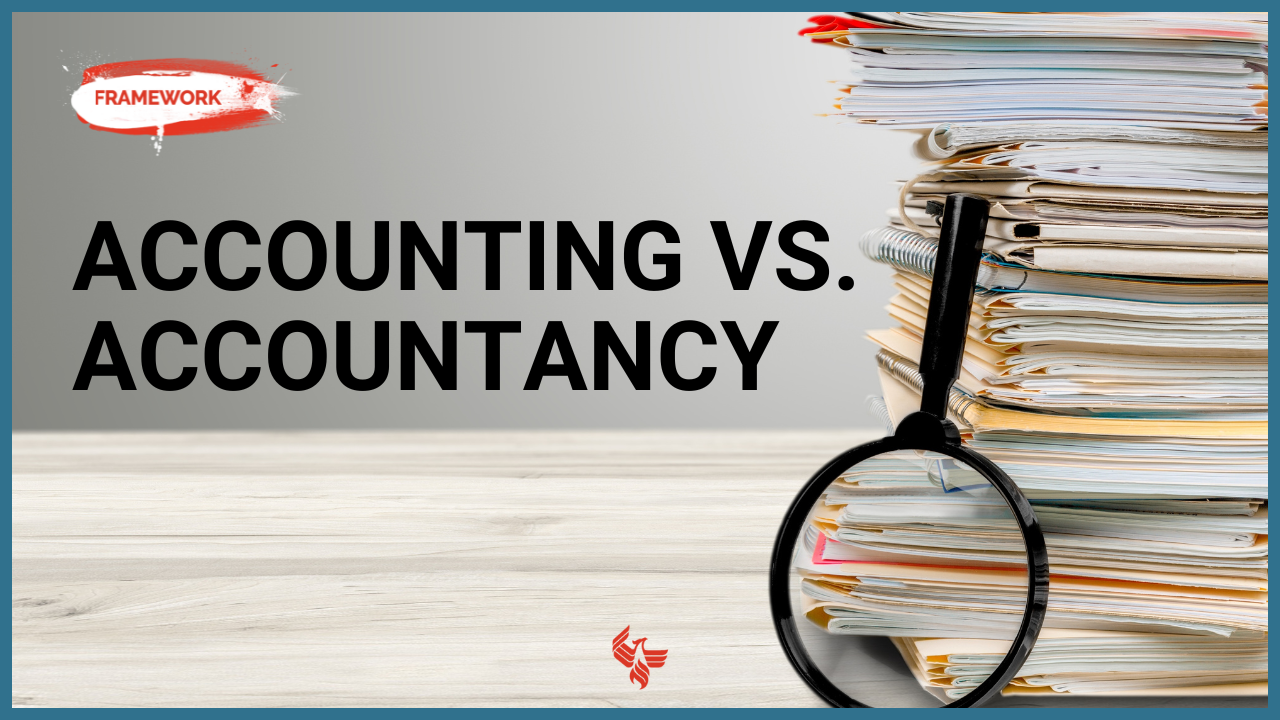Articles > Accounting > Bookkeeper vs accountant as a career
Bookkeeper vs accountant as a career

Written by Michael Feder

Reviewed by Kathryn Uhles, MIS, MSP, Dean, College of Business and IT

People tend to use the terms bookkeeper vs accountant interchangeably; however, the two roles require different skills and qualifications. Bookkeepers do not have the training or certifications to work as accountants, and accountants do not usually have the experience or software knowledge to function as bookkeepers.
Here is a look at how these two related-but-separate careers are different and insights that can help you decide which is right for you.
Careers as a bookkeeper vs accountant
One of the first things to keep in mind when comparing the job of bookkeeper vs accountant, is that accounting careers may offer flexibility and opportunities across a wide range of sectors. Accountants can specialize in government or nonprofit accounting, consulting or freelance, or work in areas like forensic accounting, auditing or education. All these career paths often start with the same type of education, with many accountants pursuing a Bachelor of Science in Accounting degree.
Bookkeepers and accountants can learn specialized skills as they progress through their degree programs and gain on-the-job experience. That being said, if this is your chosen field, it is crucial to make one important decision at the very start.
What's the difference between a bookkeeper vs accountant?
Bookkeepers and accountants generally need different degrees and training to begin their careers. Though they both work with financial statements, their daily duties are distinct, and they rely on different software, tools and processes.
Most importantly, expected salary, growth prospects and additional career opportunities are different for accountants than for bookkeepers.
Here is a closer look at the distinctive aspects of these two careers.
Education requirements
The differences between accounting and bookkeeping start with the educational requirements.
According to the U.S. Bureau of Labor Statistics (BLS), bookkeepers can begin a career as a bookkeeping clerk with a high school diploma. There are college courses, leading to certification, that teach popular bookkeeping software. Also, the American Institute of Professional Bookkeepers offers a Certified Bookkeeper (CB) accreditation.
Bookkeepers looking for career enhancement opportunities or jobs with larger corporations might consider a finance or business-related associate degree.
Accounting has stricter education requirements. Entry-level positions require at least a bachelor’s degree in accounting, though some employers prefer a graduate degree. According to the BLS report on accounting, many colleges offer bachelor’s and master’s degree programs for specific specializations, such as tax accounting or forensic auditing. Other specialties are available through continuing education or professional development courses. For example, accountants could earn a college-level certificate in financial planning if they were interested in long-term investment and financial strategy.
Those interested in advanced work in the accounting field can pursue becoming a Certified Public Accountant (CPA), which requires a degree and passing a four-part exam. This designation is required if you plan to produce financial reports for publicly traded companies. In addition, many firms require in-house accountants to be licensed CPAs.
A bookkeeper or accountant who chooses to work independently as a consultant or freelancer may benefit from business-related courses. If this is your chosen career path, you can earn a small-business management certificate to learn how to operate your own business.
Job responsibilities
Bookkeepers and accountants work on different aspects of financial statements.
Bookkeepers’ duties include using software and spreadsheets to record information about transactions, spending, cash flow, income and other finance-related data. They enter numbers into the system, but they do not analyze them beyond verifying their correctness.
As a bookkeeper, you might create financial reports such as balance sheets for nonpublic companies. However, you will typically work with raw financial data and not offer insights into compliance or performance.
An accountant’s duties include verifying that financial records comply with relevant regulations and standards. In this career, you might also complete tax returns, assess budget performance and financial operations, and work on financial risk management.
Some accountants spend their workdays assessing financial transactions and records to find areas to cut costs, increase income and improve profit margins.
Industries
One of the most attractive aspects of bookkeeping and accounting careers is that companies in almost every industry rely on specialists in these fields. Enterprises and medium-size companies often have in-house accountants and bookkeepers. There are also opportunities with third-party service providers who handle bookkeeping, accounting, tax preparation and financial reporting for companies and organizations that may not have in-house staff.
Bookkeepers are often employed by professional, scientific and technical services companies, retail or wholesale companies, or financial firms. Other industries that employ bookkeepers include insurance and healthcare.
In addition to working for corporations or businesses, accountants often find employment with financial firms, insurance agencies, auditing companies and government entities. According to BLS, about 4% of accountants are self-employed.
Salary
Salary ranges for these two career paths are different.
As of May 2024, bookkeepers earned between $34,600 and $72,660, with a median wage at $49,210, according to BLS. Those who work in finance or insurance are typically on the higher end of this pay scale, and retail and healthcare bookkeepers usually have lower earning
As of May 2024, accountants earned between $52,780 and $141,420, with a median wage of $81,680, according to BLS. Average accountant salaries are similar across all specialties, with those working in insurance and finance experiencing marginally higher incomes.
The salary ranges are not specific to students or graduates of University of Phoenix. Actual outcomes vary based on multiple factors, including prior work experience, geographic location and other factors specific to the individual. University of Phoenix does not guarantee employment, salary level or career advancement. BLS data is geographically based. Information for a specific state/city can be researched on the BLS website.
Job outlook
The demand for qualified employees is another area where accounting and bookkeeper careers are very different. According to BLS, the demand for bookkeepers is predicted to fall by 6% between 2024 and 2034 as financial software becomes more advanced. Business owners will probably still have bookkeepers, but fewer employees will be able to manage record-keeping operations.
Over the same period, the demand for accountants is projected to grow by 5%. The same advances and automation will also affect the accounting industry. Accountants will remain in demand because they can generally offer insights that a computer cannot match. In addition, the globalization of commerce, new and more complex tax laws, and expanding technologies may lead to new opportunities for accountants.
BLS Occupational Employment Projections, 2024-2034 is published by the U.S. Bureau of Labor Statistics. This data reflects BLS’ projections of national (not local) conditions. These data points are not specific to University of Phoenix students or graduates.
How to choose the right field for you
Both accounting and bookkeeping jobs are ideal if you like to work with figures or are interested in finance.
If you have a more analytical and strategic mind, the accounting profession may provide the type of challenges that excite you. If you prefer tasks that require attention to detail, involve working with computer programs and financial data, and require good math knowledge, bookkeeping might be a better fit.
You should keep in mind that more business owners are seeking third-party providers to handle their bookkeeping tasks. This makes bookkeeping a good option if you want to become an entrepreneur and use your skills in your own business.
Degrees for a career as a bookkeeper vs accountant
Have you thought about whether you'd rather work as a bookkeeper vs accountant? While University of Phoenix doesn’t have degrees in bookkeeping, it does offer programs in accounting and financial planning. These degree programs help prepare students with the foundational skills to pursue a career in this field.
- Bachelor of Science in Accounting: Build the foundational skills necessary to succeed in the accounting field, such as evaluating financial and legal information to make critical business decisions, with this online accounting degree.


ABOUT THE AUTHOR
A graduate of Johns Hopkins University and its Writing Seminars program and winner of the Stephen A. Dixon Literary Prize, Michael Feder brings an eye for detail and a passion for research to every article he writes. His academic and professional background includes experience in marketing, content development, script writing and SEO. Today, he works as a multimedia specialist at University of Phoenix where he covers a variety of topics ranging from healthcare to IT.

ABOUT THE REVIEWER
Currently Dean of the College of Business and Information Technology, Kathryn Uhles has served University of Phoenix in a variety of roles since 2006. Prior to joining University of Phoenix, Kathryn taught fifth grade to underprivileged youth in Phoenix.
This article has been vetted by University of Phoenix's editorial advisory committee.
Read more about our editorial process.






